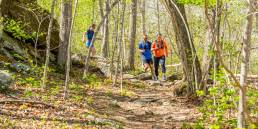At some point, many of us have thought about quitting our day job and taking off on an epic road trip or camping trip. Maybe we’ve read On The Road or A Walk in the Woods too many times. But there are always the practicalities of everyday life: We need an income to survive, and very few people can just up and go whenever they want. Blythe Roberson had been daydreaming about road trips for a while, planning them out but never going, and instead, road tripping and camping whenever she could get off work. She also wondered what a road trip book would look like if a woman wrote it: traveling as a single woman is much different than a single man—unwanted advances, the fear of violence, not to mention periods. So in 2019, she decided to find out.
In America the Beautiful?: One Woman in A Borrowed Prius on the Road Most Traveled, Roberson takes us on a road trip around the country to various national parks. She decided to only go to the parks where she hasn’t yet earned a Junior Ranger badge, and to save money, she would free-camp each night. While she did have some questions in mind about the parks and what she wanted to learn, she wanted to give herself over to the trip, unplug, and see what unfolded.
“Here’s the thing about the Junior Ranger program: it’s not just a way for children and kooky adults to acquire pins through the diligent completion of word searches. The booklets are honestly a great way to learn about a park. I didn’t realize the truth of this until a few years before my trip, when a (real) park ranger at Rocky Mountain National Park told me that when on vacation she did Junior Ranger books too, because it was the quickest way to get a good sense of the park she was visiting….” (p. 63).
What follows is a fun, thought-provoking journey that brings up a lot of questions, provides only some answers, and makes the reader want to take off on a journey of their own. Roberson is a comedian, so it’s no surprise the book is a funny, wry memoir. But don’t mistake her sense of humor for a light book: She writes about the very real safety concerns for women traveling alone, the realities of driving across the country and things like mechanical issues and flat tires, and thinking about the national parks and the historical and contemporary contexts in which they’re situated.
She breaks the book down into various parts, with multiple chapters in each: The Plains, The Intermountain West, The West Coast, and The Southwest. While she does write about traveling as a single woman and the varied politics in each state she visits, she also explores the NPS itself, its political history, the history of the park system and individual parks, and the controversies surrounding land conservation and protected land. She writes about the impact that tourism and increased visitation of the parks has on the ecosystem of the parks, and muses about her own contribution to that problem. She also examines the effects of climate change and what it means for the future of the parks: both Joshua Tree National Park and Sequoia National Park are at risk for losing their namesake trees, due to climate change, hotter climates, and wildfires. Glacier National Park had 150 glaciers in 1850; by 2030 there’s a good chance that number will be zero.
What Roberson does best is that while she provides apt and incisive commentary on America’s sociopolitical issues and environmental issues, she also never fails to appreciate what road tripping allows her: appreciation of the land, appreciation for our country, and appreciation for being able to get outside and do what she’s doing. She writes, “Travel is a way to more deeply understand America, to grapple with its flaws, but also to see what is – don’t cancel me – beautiful about it….” (p. 250). She never takes her trip for granted and is always keenly aware of her circumstances, making it markedly different from many other travel or roadtrip memoirs.
It’s a book that lays bare the problems facing the park system, but also a book celebrating it; a book that delves into issues in the outdoors community, but also a book affirming her love for it. These seemingly contradictory things end up being what makes the book such a joy to read; a reminder that life and travel can be messy and beautiful and hard, but always ultimately worth it.
Jaime Herndon
Jaime Herndon is a science writer and editor who loves the national parks and enjoys introducing her son to hiking and being outdoors. She’s so thankful that homeschooling has been the catalyst for getting her outside more and one day hopes to hike the Appalachian Trail.




